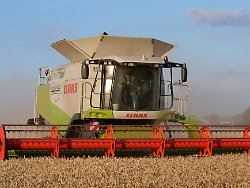Climate change continues to affect agriculture. The drought in particular is a problem for many farmers. Overall, however, Agriculture Minister Klöckner is satisfied with the harvest balance. And she speaks of a new awareness of food among the population.
According to the provisional official balance sheet, the grain harvest this year was lower than last year. According to the Federal Ministry of Agriculture, this was mainly due to the fact that the cultivation area was almost five percent smaller. Across Germany, a harvest volume of 42.9 million tons is expected for 2020. That is a good three percent less than in 2019 and six percent less than the average for 2014 to 2019.
Winter wheat in particular, the most productive grain in Germany, was cultivated less. One reason for this was autumn 2019, which was sometimes too wet for sowing. The increased cultivation of summer cereals could not compensate for the minus. "The national average yields are better than expected, albeit slightly below average," said Federal Agriculture Minister Julia Klöckner in Bonn. There are strong regional fluctuations, depending on soil quality and water supply. For the third year in a row, farmers had to contend with drought and late frosts. "That shows once again how crucial the increased adaptation to climate change is," said the CDU politician.
The report is based on yields from thousands of test areas from all over Germany. According to the ministry, the yield per hectare determined to date is 6.9 tonnes on average for all types of grain, but not including grain maize. That is 1.3 percent more than in 2019. It is a "satisfactory harvest in comparison to the past three years, keyword drought years," said Klöckner. After a slump last year, rape was grown a little more again. The yield per hectare was good here at around 3.7 tons. A total of around 3.5 million tonnes of rapeseed would be harvested, 24.4 percent more than in 2019, but 20.7 percent less than the six-year average.
There are no harvest workers due to Corona
According to the information, the harvest of fruit and vegetables is almost consistently lower than in the previous year. One reason for this is the weather with late frosts and little rain, another that harvest workers were missing in the Corona crisis despite exceptional permits. Klöckner said that during the Corona crisis, the supply of food was secured at all times. But there is a new awareness that harvests and full supermarket shelves are not a matter of course. She is pleased that the interest in regional production and agriculture in general has increased.
The German Farmers' Association recently presented the effects of the Corona crisis on the harvests as rather minor. Instead, association president Joachim Rukwied focused on the growing risks posed by climate change. The farmers are demanding state help in setting up so-called multi-risk insurance.
.
